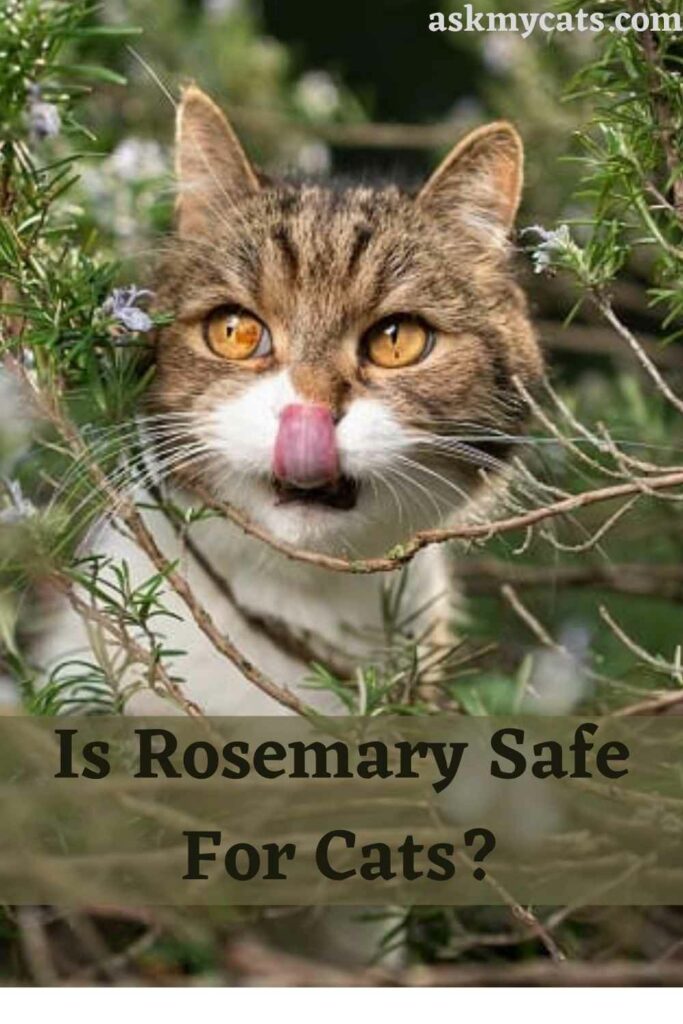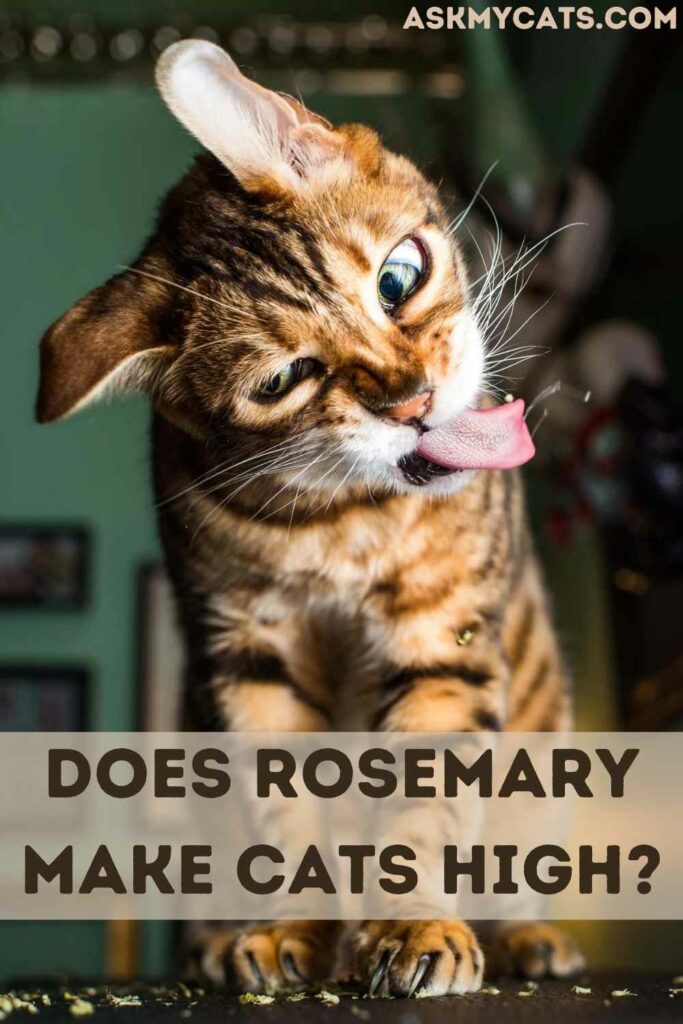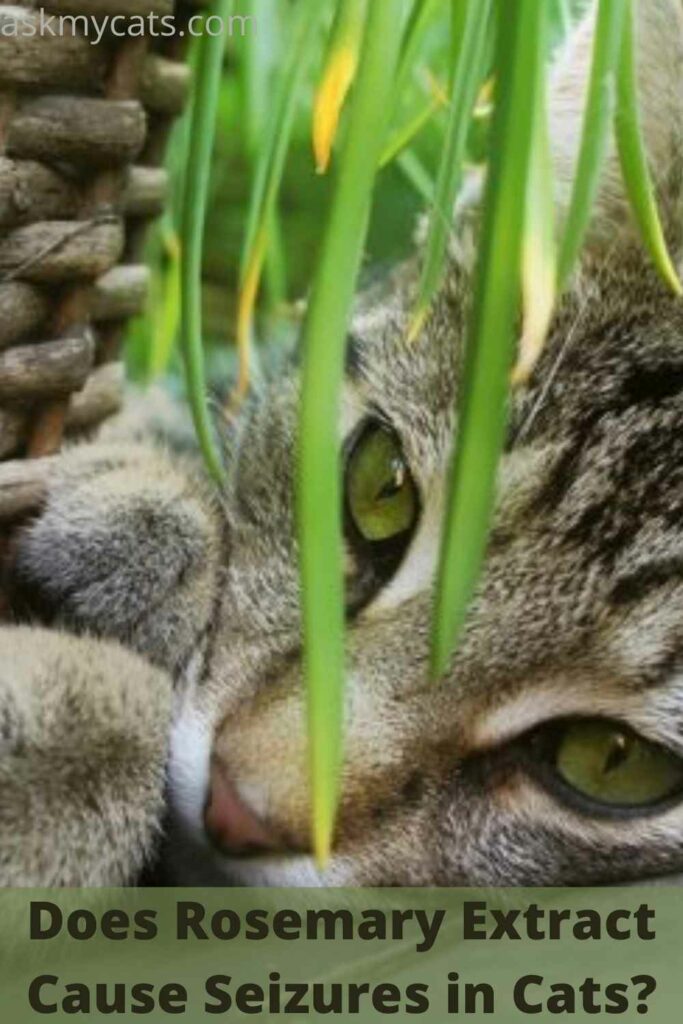Rosemary is a natural preservative of omega 3-rich oils and is high in antioxidants. Rosemary contains natural substances called carotenoids and polyphenols, which may be suitable for your health. However, modern science has yet to discover evidence of rosemary’s health advantages. Despite this, rosemary has a distinct and deep perfume, making it a favorite flavor worldwide. However, can cats eat rosemary?
Yes, cats can eat rosemary. You won’t have to worry if you have rosemary in your garden. It’s unlikely that your cat will find it appealing. Even if she does, a few nibbles of it are absolutely safe. Cats are completely unaffected by fresh rosemary. Only if your cat consumes a substantial amount of rosemary can stomach discomfort and vomiting occur.
Keep reading the article to know how much rosemary is safe for cats and how to feed your cat rosemary.


Give Your Cat the Perfect Day
Get the Free Ebook!
Why Does My Cat Eat Rosemary?
Your cat may eat rosemary as it is flavourful and non-toxic to your cat and also has flee-repellent properties.
Cats often dislike rosemary. The herb is frequently used in gardens as a cat deterrent. However, some cats prefer rosemary because of its anti-flea properties.
Rosemary does not have any medical properties, but it is tasty and non-toxic to cats.
The main reason that boils down to your cat eating rosemary is its personality. It is impossible to predict a cat’s behavior; while most don’t like rosemary, there will always be one oddball who loves to chew on them.
Is Rosemary Safe For Cats?
Yes, rosemary is safe for cats as it is excluded from the list of poisonous plants for pets and is not toxic to cats.

You might want to grow a garden with herbs like rosemary, but you want to make sure it’s safe for your cat.
Alternatively, you may have lately noticed your pet chewing on rosemary and are concerned about any potential adverse effects.
Whatever be your concern regarding the harm caused to your cat, there is no need to panic.
Cats should not consume some plants and foods, but rosemary is not one of them.
This herb is not dangerous to cats and is not on the list of poisonous plants for pets.
As long as only a tiny amount is consumed, it is entirely safe. It has a strong odor that deters animals from eating large amounts of it.
This implies your cat won’t be able to chew on a large enough amount of the plant to be damaging or hazardous.
You don’t have to be afraid about your cat’s safety if you have rosemary about the house. However, it’s crucial to ensure your pet doesn’t eat too much rosemary because it might cause gastrointestinal trouble.
However, because cats are carnivores, there’s a slim possibility the cat will consume a large amount of rosemary, even if it chews on the plant out of curiosity.
Is Rosemary Toxic To Cats?
No, rosemary is not toxic to cats as it is not included in the list of poisonous plants for pets.
If a cat eats rosemary in moderate amounts, then it will do no harm. However, you must ensure that your pet does not consume too much rosemary, as it may create stomach problems for your cat.
It has a strong odor that prevents cats from consuming vast quantities of it. This means that your cat won’t be able to gnaw on enough of the plant to cause damage or danger.
Does Rosemary Make Cats High?
Rosemary can make cats high, and they can show symptoms like becoming playful and getting excited, and then going to sleep.

According to Jim Simon, a professor of plant biology and co-director of the Center for Sensory Sciences and Innovation at Rutgers University in New Brunswick, New Jersey, the compound that plays the most important role in the Rosemary effect in domestic cats is nepetalactone, which is produced in specialized glands in rosemary’s leaves and flowers.
“Usually, when you buy rosemary from a nursery, it’s a hybrid intended for ornamental purposes; they don’t attract cats because they have very little nepetalactone,” Simon told Live Science.
Other chemicals in rosemary have molecular structures that are similar to nepetalactone’s, and some can even stimulate a response on their own.
Still, nepetalactone is the most powerful, according to Simon.
The odor of nepetalactone attracts cats because it binds to receptors in their noses and causes them to behave euphorically.
Dr. Bruce Kornreich, associate director for education and outreach at Cornell University College of Veterinary Medicine in Ithaca, New York, claimed that other chemicals in rosemary impact neurotransmitters, “resulting in suppression of central nervous system activity.”
On the surface, a cat’s reaction to rosemary appears to be comparable to a human’s response to a narcotic substance.
“They become anxious and playful, they become stimulated, and then they fall asleep. However, there is no evidence that rosemary works in the same manner that medicinal cannabis, marijuana, or cocaine do, “Simon remarked.
In humans, consuming alcohol, marijuana, heroin, or cocaine causes brain cells to produce dopamine, which has a mood-altering effect.
While cats may appear to be having a good time rolling around in rosemary, scientists can’t say for sure what’s going on in their heads and how the plant affects them, according to Kornreich of Live Science.
However, when cats are given drugs like naloxone, which inhibit opioid receptors in the central nervous system, the effects of catnip rosemary are reduced or even eliminated, implying that opioid receptors are involved.
Can Cats Eat Rosemary Extract?
Yes, cats can eat rosemary extract but only when it is present in cat food.
You should avoid rosemary extract since it can cause various complications in cats, including digestive troubles, depression, and, in rare cases, even death.
Only in largee dosages can rosemary extract induce gastric disorders. As a result, avoid giving rosemary extract to your cat.
In tiny amounts, rosemary extract may be used in some commercial cat food recipes. While this may be fine for your cat, some cats may have an allergic reaction to the substance.
If your cat has any negative responses to his cat food and it contains rosemary extract, contact your pet’s veterinarian straight away to check your cat does not have a rosemary allergy or sensitivity.
Because of its antimicrobial properties, rosemary extract is utilized in some cat foods. The amount of extract in cat food, on the other hand, is almost unquantifiable.
There’s no need to steer clear of cat food containing rosemary extract.
Does Rosemary Extract Cause Seizures in Cats?
Yes, rosemary extract can cause seizures in cats, which is why it must be given only with the vet’s recommendation.

When veterinarians complained that a certain pet food was causing neurological difficulties in cats, research revealed that one batch lacked Vitamin B1 (thiamine).
Still, rosemary extract, a natural neurotoxin, maybe the underlying culprit in cats’ food ingredients.
Adverse responses, such as seizures or other symptoms, may take longer to manifest, making correct diagnosis more difficult.
Since cat food producers began adding rosemary extracts and other substances that aren’t meant for carnivores, seizures, allergies, and brain function issues have increased.
Few veterinarians are aware of the dangers of rosemary and other herbs.
Many veterinarians are unaware that herbs have become a common element in pet food.
Unfortunately, a veterinarian may begin treating a cat for epilepsy without ever suspecting the actual cause of the seizures. While phenobarbital will control or lessen seizures, the animal will continue to eat it, causing neurological damage.
According to the University of Maryland Medical Centre, Rosemary can interact with supplements, drugs, and even other herbs.
The phrase “herbal extracts should be used under the supervision of a healthcare practitioner” appears in almost every reference to herbal use. Allergic responses have been reported as a result of the volatile oil content.
Experts should avoid artificially colored kibble and treats and instead choose organically certified, frozen, freeze-dried, or preservative-free canned foods.
Variety is the spice of life, and one approach to avoid deficiencies or excesses is to try a variety of brands and protein constituents.
Rosemary Benefits For Cats
Rosemary is a fragrant herb that offers a good source of vitamins A and C, iron, calcium, folate, and manganese and is classified as non-toxic by the ASPCA. Some of the benefits of rosemary for your cat given in the correct quantity are: –
- improve digestion
- improve skin and coat health
- reduce inflammation and swelling
- protect and improve eyesight
- protect your pets from free radicals due to antioxidants
- fight infections due to its antibacterial, antifungal, and antiseptic properties
Is Rosemary Essential Oil Safe For Cats?
Rosemary oil is safe for cats but only when applied to the cat’s body and not for eating purposes.
Rosemary oil is a popular choice for aromatherapy and topically applied effects. Rosemary is one of the essential oils that is regarded to be cat-safe.
When maintained near pets, it is an effective flea repellent as well as a source of relaxation. While rosemary oil is safe for cats when used in a diluted form around them, it is not recommended for them to eat it.
When utilizing essential oils like rosemary with cats, it’s necessary to be cautious. These animals are carnivores, and their digestive systems are not the same as ours.
Some of the chemicals found in these oils are too strong for them to manage. This is why you should always keep an eye on your pet to ensure they aren’t ingesting rosemary oil.
Furthermore, cats have very thin skin, which allows for rapid absorption of chemicals into circulation. This implies that you can see the results right away when you use the oil as a topical treatment.
While rosemary oil is safe for cats, it’s crucial to keep an eye on them to avoid any adverse reactions.
Drooling, difficulty walking, vomiting, lethargy, difficulty breathing, swelling, or other significant consequences should be reported to your veterinarian very away.
How Can I Safely Give Rosemary To My Cat?
You can give rosemary to your cat safely by introducing and including it in your cat’s meal; remember to start with very small portions. This way, you can easily see if the herb has a negative effect on your cat.
Use the amount prescribed by your veterinarian and finely slice fresh or dried rosemary into tiny pieces before sprinkling it on top of your cat’s favorite food.
Remember to start with very modest portions, just as you would with any other food you want to introduce and include in your cat’s diet. You can readily see if the herb has a negative impact on him this way.
You can even pick for a gourmet pet food that has been enhanced with nutritious, aromatic herbs like rosemary for a hassle-free solution. Wishbone Pet Foods offers delectable gourmet dishes for cats and dogs.
Frequently Asked Questions
How much rosemary should I feed my cat?
Ans. Rosemary is a healthy and healthful plant that your cat can relish and enjoy if ingested in small amounts. It can be added to your cat’s food as a flavor enhancer. But, like with most things, too much of a good thing can be detrimental. This plant might be hazardous if consumed in large quantities by your cat.
How is rosemary good for cats?
Ans. Rosemary isn’t poisonous to cats. It’s a herb that’s high in Vitamin A and C, as well as folate and calcium. Rosemary has been used to aid cats with digestive problems in the past. In some cases, rosemary could be utilized as a part of a therapeutic plan to combat inflammation. The condition of a cat’s coat and skin may also be improved by using this plant.
What harm can rosemary cause to my cat?
Ans. The rosemary plant has a pungent aroma that your cat would not enjoy. Expect a puke look from any cat who tries to smell this. Otherwise, if your cat ate too much rosemary, they might have stomach pains and discomfort. When too much rosemary is consumed, some cats may vomit.
Final Words
Although cats are not known to consume rosemary, a small amount will not harm them. While there is no reason to feed rosemary or any other herb to your cat, it is neither harmful nor detrimental to them.
Your cat would most likely avoid the plant if you have it in your backyard. You won’t notice if she chews on it every now and then, but if you want to include rosemary in your cat’s diet, see your veterinarian first.
If you have any unanswered questions feed free to ask in the comments sections.
